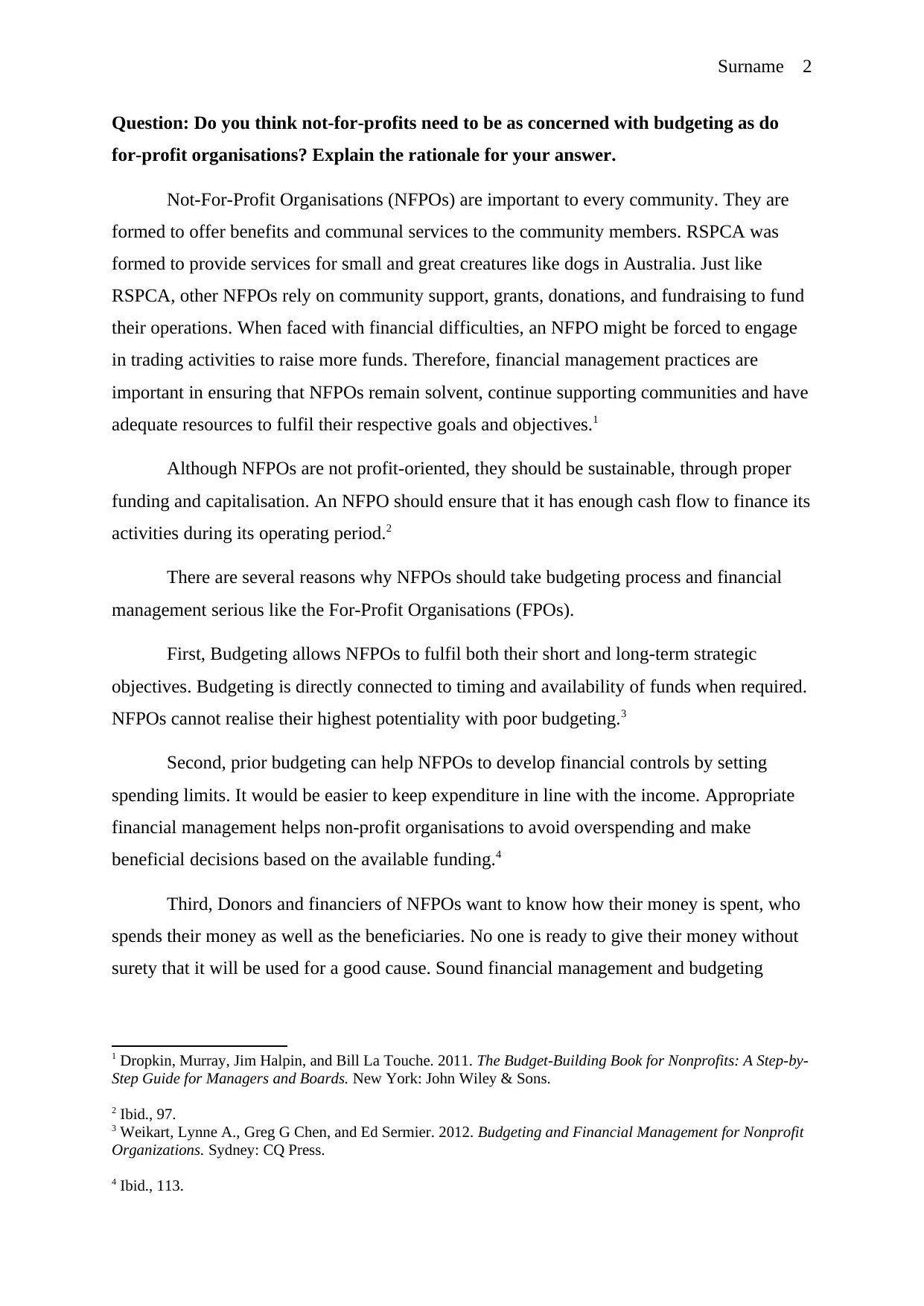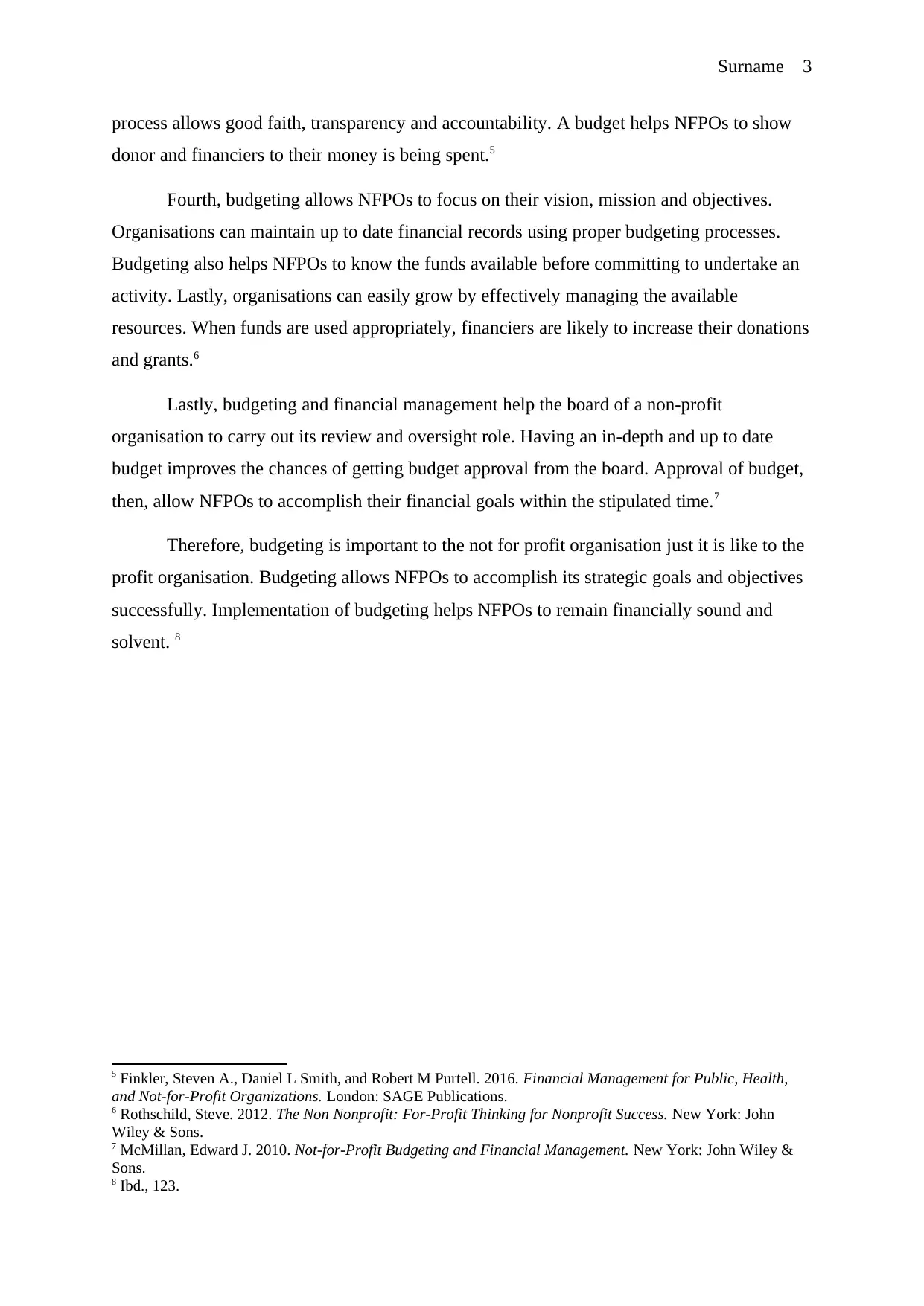BUS287 Management Accounting: Why NFPOs Need Budgeting as Much as FPOs
VerifiedAdded on 2023/06/03
|4
|847
|123
Essay
AI Summary
This essay argues that not-for-profit organizations (NFPOs) need to be as concerned with budgeting as for-profit organizations (FPOs). It highlights that NFPOs, like RSPCA, rely on community support and donations, making financial management crucial for sustainability and achieving strategic objectives. The essay details several reasons for this, including enabling NFPOs to fulfill short and long-term goals, developing financial controls, ensuring transparency to donors, focusing on their vision, and facilitating board oversight. Effective budgeting also allows NFPOs to maintain up-to-date financial records, manage resources appropriately, and potentially increase donations. Ultimately, the essay concludes that budgeting is vital for NFPOs to remain financially sound, solvent, and achieve their goals successfully.

Surname 1
Name
Management Accounting
Professor
Date
Name
Management Accounting
Professor
Date
Paraphrase This Document
Need a fresh take? Get an instant paraphrase of this document with our AI Paraphraser

Surname 2
Question: Do you think not-for-profits need to be as concerned with budgeting as do
for-profit organisations? Explain the rationale for your answer.
Not-For-Profit Organisations (NFPOs) are important to every community. They are
formed to offer benefits and communal services to the community members. RSPCA was
formed to provide services for small and great creatures like dogs in Australia. Just like
RSPCA, other NFPOs rely on community support, grants, donations, and fundraising to fund
their operations. When faced with financial difficulties, an NFPO might be forced to engage
in trading activities to raise more funds. Therefore, financial management practices are
important in ensuring that NFPOs remain solvent, continue supporting communities and have
adequate resources to fulfil their respective goals and objectives.1
Although NFPOs are not profit-oriented, they should be sustainable, through proper
funding and capitalisation. An NFPO should ensure that it has enough cash flow to finance its
activities during its operating period.2
There are several reasons why NFPOs should take budgeting process and financial
management serious like the For-Profit Organisations (FPOs).
First, Budgeting allows NFPOs to fulfil both their short and long-term strategic
objectives. Budgeting is directly connected to timing and availability of funds when required.
NFPOs cannot realise their highest potentiality with poor budgeting.3
Second, prior budgeting can help NFPOs to develop financial controls by setting
spending limits. It would be easier to keep expenditure in line with the income. Appropriate
financial management helps non-profit organisations to avoid overspending and make
beneficial decisions based on the available funding.4
Third, Donors and financiers of NFPOs want to know how their money is spent, who
spends their money as well as the beneficiaries. No one is ready to give their money without
surety that it will be used for a good cause. Sound financial management and budgeting
1 Dropkin, Murray, Jim Halpin, and Bill La Touche. 2011. The Budget-Building Book for Nonprofits: A Step-by-
Step Guide for Managers and Boards. New York: John Wiley & Sons.
2 Ibid., 97.
3 Weikart, Lynne A., Greg G Chen, and Ed Sermier. 2012. Budgeting and Financial Management for Nonprofit
Organizations. Sydney: CQ Press.
4 Ibid., 113.
Question: Do you think not-for-profits need to be as concerned with budgeting as do
for-profit organisations? Explain the rationale for your answer.
Not-For-Profit Organisations (NFPOs) are important to every community. They are
formed to offer benefits and communal services to the community members. RSPCA was
formed to provide services for small and great creatures like dogs in Australia. Just like
RSPCA, other NFPOs rely on community support, grants, donations, and fundraising to fund
their operations. When faced with financial difficulties, an NFPO might be forced to engage
in trading activities to raise more funds. Therefore, financial management practices are
important in ensuring that NFPOs remain solvent, continue supporting communities and have
adequate resources to fulfil their respective goals and objectives.1
Although NFPOs are not profit-oriented, they should be sustainable, through proper
funding and capitalisation. An NFPO should ensure that it has enough cash flow to finance its
activities during its operating period.2
There are several reasons why NFPOs should take budgeting process and financial
management serious like the For-Profit Organisations (FPOs).
First, Budgeting allows NFPOs to fulfil both their short and long-term strategic
objectives. Budgeting is directly connected to timing and availability of funds when required.
NFPOs cannot realise their highest potentiality with poor budgeting.3
Second, prior budgeting can help NFPOs to develop financial controls by setting
spending limits. It would be easier to keep expenditure in line with the income. Appropriate
financial management helps non-profit organisations to avoid overspending and make
beneficial decisions based on the available funding.4
Third, Donors and financiers of NFPOs want to know how their money is spent, who
spends their money as well as the beneficiaries. No one is ready to give their money without
surety that it will be used for a good cause. Sound financial management and budgeting
1 Dropkin, Murray, Jim Halpin, and Bill La Touche. 2011. The Budget-Building Book for Nonprofits: A Step-by-
Step Guide for Managers and Boards. New York: John Wiley & Sons.
2 Ibid., 97.
3 Weikart, Lynne A., Greg G Chen, and Ed Sermier. 2012. Budgeting and Financial Management for Nonprofit
Organizations. Sydney: CQ Press.
4 Ibid., 113.

Surname 3
process allows good faith, transparency and accountability. A budget helps NFPOs to show
donor and financiers to their money is being spent.5
Fourth, budgeting allows NFPOs to focus on their vision, mission and objectives.
Organisations can maintain up to date financial records using proper budgeting processes.
Budgeting also helps NFPOs to know the funds available before committing to undertake an
activity. Lastly, organisations can easily grow by effectively managing the available
resources. When funds are used appropriately, financiers are likely to increase their donations
and grants.6
Lastly, budgeting and financial management help the board of a non-profit
organisation to carry out its review and oversight role. Having an in-depth and up to date
budget improves the chances of getting budget approval from the board. Approval of budget,
then, allow NFPOs to accomplish their financial goals within the stipulated time.7
Therefore, budgeting is important to the not for profit organisation just it is like to the
profit organisation. Budgeting allows NFPOs to accomplish its strategic goals and objectives
successfully. Implementation of budgeting helps NFPOs to remain financially sound and
solvent. 8
5 Finkler, Steven A., Daniel L Smith, and Robert M Purtell. 2016. Financial Management for Public, Health,
and Not-for-Profit Organizations. London: SAGE Publications.
6 Rothschild, Steve. 2012. The Non Nonprofit: For-Profit Thinking for Nonprofit Success. New York: John
Wiley & Sons.
7 McMillan, Edward J. 2010. Not-for-Profit Budgeting and Financial Management. New York: John Wiley &
Sons.
8 Ibd., 123.
process allows good faith, transparency and accountability. A budget helps NFPOs to show
donor and financiers to their money is being spent.5
Fourth, budgeting allows NFPOs to focus on their vision, mission and objectives.
Organisations can maintain up to date financial records using proper budgeting processes.
Budgeting also helps NFPOs to know the funds available before committing to undertake an
activity. Lastly, organisations can easily grow by effectively managing the available
resources. When funds are used appropriately, financiers are likely to increase their donations
and grants.6
Lastly, budgeting and financial management help the board of a non-profit
organisation to carry out its review and oversight role. Having an in-depth and up to date
budget improves the chances of getting budget approval from the board. Approval of budget,
then, allow NFPOs to accomplish their financial goals within the stipulated time.7
Therefore, budgeting is important to the not for profit organisation just it is like to the
profit organisation. Budgeting allows NFPOs to accomplish its strategic goals and objectives
successfully. Implementation of budgeting helps NFPOs to remain financially sound and
solvent. 8
5 Finkler, Steven A., Daniel L Smith, and Robert M Purtell. 2016. Financial Management for Public, Health,
and Not-for-Profit Organizations. London: SAGE Publications.
6 Rothschild, Steve. 2012. The Non Nonprofit: For-Profit Thinking for Nonprofit Success. New York: John
Wiley & Sons.
7 McMillan, Edward J. 2010. Not-for-Profit Budgeting and Financial Management. New York: John Wiley &
Sons.
8 Ibd., 123.
⊘ This is a preview!⊘
Do you want full access?
Subscribe today to unlock all pages.

Trusted by 1+ million students worldwide

Surname 4
Bibliography
Dropkin, Murray, Jim Halpin, and Bill La Touche. 2011. The Budget-Building Book for
Nonprofits: A Step-by-Step Guide for Managers and Boards. New York: John Wiley
& Sons.
Finkler, Steven A., Daniel L Smith, and Robert M Purtell. 2016. Financial Management for
Public, Health, and Not-for-Profit Organizations. London: SAGE Publications.
McMillan, Edward J. 2010. Not-for-Profit Budgeting and Financial Management. New York:
John Wiley & Sons.
Rothschild, Steve. 2012. The Non Nonprofit: For-Profit Thinking for Nonprofit Success. New
York: John Wiley & Sons.
Weikart, Lynne A., Greg G Chen, and Ed Sermier. 2012. Budgeting and Financial
Management for Nonprofit Organizations. Sydney: CQ Press.
Bibliography
Dropkin, Murray, Jim Halpin, and Bill La Touche. 2011. The Budget-Building Book for
Nonprofits: A Step-by-Step Guide for Managers and Boards. New York: John Wiley
& Sons.
Finkler, Steven A., Daniel L Smith, and Robert M Purtell. 2016. Financial Management for
Public, Health, and Not-for-Profit Organizations. London: SAGE Publications.
McMillan, Edward J. 2010. Not-for-Profit Budgeting and Financial Management. New York:
John Wiley & Sons.
Rothschild, Steve. 2012. The Non Nonprofit: For-Profit Thinking for Nonprofit Success. New
York: John Wiley & Sons.
Weikart, Lynne A., Greg G Chen, and Ed Sermier. 2012. Budgeting and Financial
Management for Nonprofit Organizations. Sydney: CQ Press.
1 out of 4
Related Documents
Your All-in-One AI-Powered Toolkit for Academic Success.
+13062052269
info@desklib.com
Available 24*7 on WhatsApp / Email
![[object Object]](/_next/static/media/star-bottom.7253800d.svg)
Unlock your academic potential
Copyright © 2020–2026 A2Z Services. All Rights Reserved. Developed and managed by ZUCOL.





